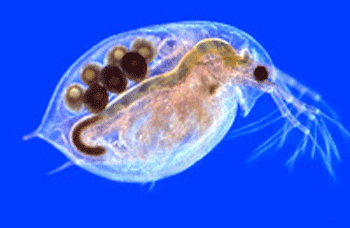January 23, 2014 at 3:30 p.m.
So. Center Lake 700-year old organism 'resurrection' one for the evolution ecology record books
A scientific investigative practice called “resurrection ecology” has brought to life a 700-year old organism, extracted from the bottom of South Center Lake. The scientific community learned about this life form, believed to be the oldest ever resurrected, through a study published in Ecology Letters. The study was supervised by University of Oklahoma evolutionary ecologist Lawrence J. Weider. The fascinating news was picked-up by New York Times journalist Carl Zimmer; who has now introduced South Center Lake into dinner party talk and scholarly gossip across the globe, with his recent piece in the New York Times. Zimmer quotes experts as saying the South Center Lake organisms, “... are probably the oldest animals ever resurrected.”
South Center Lake was chosen to sample for zooplankton; in this case water fleas, as part of an effort to “chronicle the evolutionary response to cultural eutrophication in daphnia.” (water fleas) South Center Lake came to the attention of this group of researchers because it is in The Sentinel Lakes program, a special long term monitoring effort of the MN Pollution Control Agency and the MN Dept. of Natural Resources. There exists tons of data on South Center Lake’s catchment area, its water quality and other useful information. Farming and land use records back to the 1800s were highly useful in this research, according to the article in Ecology Letters.
The team was on South Center Lake in July 2010 and July 2011, taking vertical sediment cores while aboard a pontoon. Through geologic dating practices, the age of the sediment core was determined. The study, using Lead 210 showed South Center lake sediment could be 1,600 years old. (Testing with Carbon 14 continues in order to confirm this.) Samples showed “...initiation of cultural eutrophication” or massive increases of phosphorus from manmade sources, as early as the late 1800s. Eutrophication of a lake is a process that triggers worsening poor water quality, low sunlight penetration, etc. when nutrients like phosphorus are over-abundant. The 700-year old fleas were “resurrected” from eggs/hatchlings in the sediment samples. DNA is extracted from eggs and remains, and researchers were able to separate 394 individuals, the study report stated.
The reason the evolutionary scientists research water fleas is their utilization of Phosphorus, or how they use it as food. The team studied phosphorus retention in the creatures in relation to supply of Phosphorus. The first artificial phosphorus fertilizer was patented in 1859, the study notes. The sediment samples show huge increases in Phosphorus content starting in the late 1800s. The fleas resurrected from DNA material throughout various geologic periods allow for comparing organisms through decades and their evolutionary shifts. The preliminary conclusions are that the Center City fleas existing before colonization display different Phosphorus retention characteristics than fleas less old. The spike in Phosphorus in the sediment “coincides” with the changes in the flea genes. Meanwhile, “...the evolutionary consequences of human alterations to the Phosphorus cycle remain poorly understood,” the article states. There could be factors like fish stocking or turbidity (boat motors) affecting DNA and the evolution of the water fleas, and not just Phosphorus. Someday, the goal of resurrection ecology research is to “forecast the future of biota.”



Comments:
Commenting has been disabled for this item.